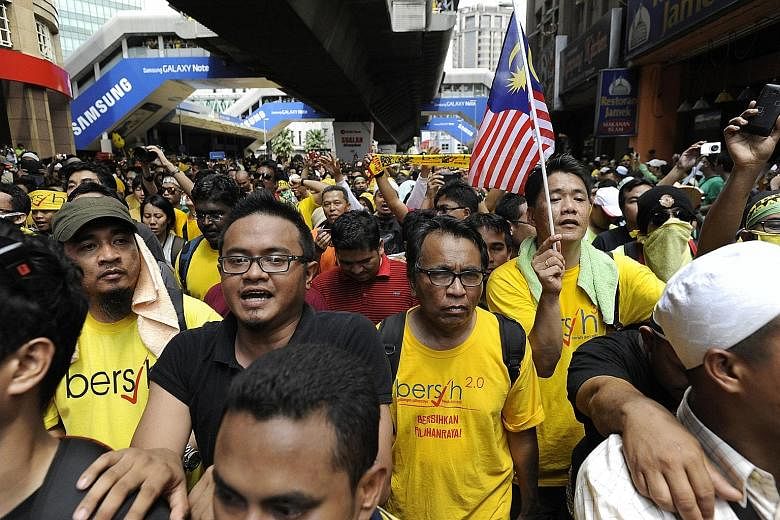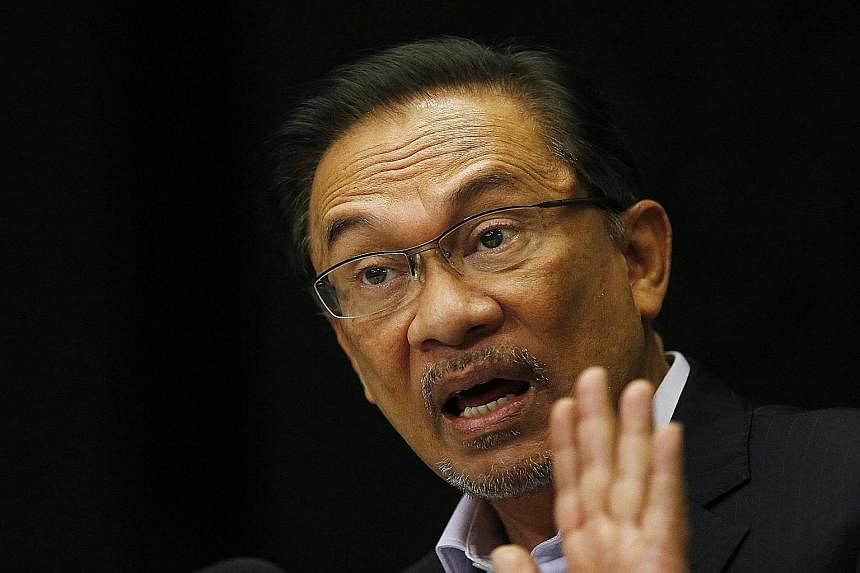Malaysian opposition chief Anwar Ibrahim has included two Islamic non-governmental organisations (NGOs) as working partners in a new Malaysian opposition alliance being cobbled together.
Anwar, who is in jail, said in a note released by his political party yesterday that the Islamic Youth Movement of Malaysia (Abim), which he once led, and the Islamic welfare and outreach group Ikram Malaysia Organisation will help broaden the opposition's reform agenda.
The co-opting of the two conservative Muslim mass organisations follows the ditching of former opposition pact partner Parti Islam SeMalaysia (PAS) in June after internal bickering.
The two NGOs are not full members of the alliance - which some have nicknamed Pakatan Rakyat (PR) 2.0 - because they are not political parties, but will have a say in its general direction, their leaders said.
Anwar also named political activist group Bersih and the Gerakan Harapan Baru (GHB), or New Hope Movement, as other partners in the upcoming alliance. GHB was formed by the leaders of PAS who lost in the Islamic party's internal polls last month, and is applying to become a political party.
"We are working towards a strengthened coalition which will work together with all progressive forces, including NGOs such as the Bersih coalition, Abim, Ikram and newly formed Gerakan Harapan Baru," Anwar wrote.
"This coming together of a wide range of groups committed to reform and change will offer a genuine democratic and just alternative to the people."
Ikram secretary-general Nahar Md Noor told The Straits Times: "Ikram will remain as an NGO but our members will actively participate in the setting up of the new political party Gerakan Harapan Baru."
Asked about Abim's role in the alliance, its president Amidi bin Abdul Manan said: "We will not be involved in elections. Our role is to contribute ideas on Malays, political Islam."
The current members of the so-called PR 2.0 are Chinese-based Democratic Action Party (DAP) and Anwar's Parti Keadilan Rakyat (PKR), which projects a multiracial outlook.
-
New partners
-
SLAMIC YOUTH MOVEMENT OF MALAYSIA (ABIM)
 • Founded in 1971 with opposition leader Anwar Ibrahim as secretary-general, who later became president
• Founded in 1971 with opposition leader Anwar Ibrahim as secretary-general, who later became president• Former leaders have posts in opposition, including PAS president Abdul Hadi Awang
• Popular among educated and urban Malay youth
• Has about 60,000 members
IKRAM MALAYSIA ORGANISATION
 • Formed by a merger in 2009 of about half a dozen Muslim groups, including Jamaah Islah Malaysia
• Formed by a merger in 2009 of about half a dozen Muslim groups, including Jamaah Islah Malaysia• Active in Islamic socio-economic issues
• Works in Muslim outreach to spread the religion
• Has about 14,000 members
COALITION FOR CLEAN AND FAIR ELECTIONS (BERSIH)
 • Formed in 2005 to push for electoral reform
• Formed in 2005 to push for electoral reform• Organised two massive street rallies in 2011 and 2012
• Current chief is women's activist Maria Chin Abdullah
The original PR alliance had PAS as its third member, but the Islamic party was dumped after it pushed for the harsh Islamic penal code called hudud to be implemented in Kelantan state.
GHB, while led by former PAS deputy president Muhammad Sabu and former vice-president Salahuddin Ayub, does not have much grassroots support. Hence the need to rope in Abim, Ikram and Bersih with their wider grassroots network, analysts said.
Still, the strategy to co-opt Islamic NGOs may have limitations.
Political analyst Chandra Muzaffar said Abim and Ikram could be restricted in mobilising the masses because they are NGOs and not political parties.
The defunct PR alliance was set up after the 2008 General Election when the loose grouping of DAP, PKR and PAS won five out of Malaysia's 13 states in a record win for the opposition.
And while it managed to retain only three states in the 2013 General Election, namely Kelantan, Penang and Selangor, the opposition for the first time denied the ruling Barisan Nasional (BN) coalition the popular vote. PR won 50.87 per cent of the total valid votes against BN's 47.38 per cent, with the remainder 1.75 per cent being spoilt votes.
With confidence in Umno-led BN affected by the financial scandal revolving around Prime Minister Najib Razak and the 1Malaysia Development Berhad state fund, the opposition is hoping to regain its lost public support following the months-long open spat over hudud between the DAP and PAS, analysts said. Bersih, which has held street rallies calling for electoral reform attended by tens of thousands of people, yesterday said its involvement in the new opposition alliance will not be partisan.
"Bersih welcomes the inclusiveness of this new coalition, but stresses that it does not side with any political party," it said in a statement.


